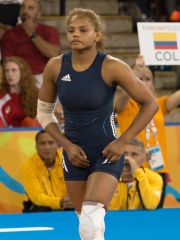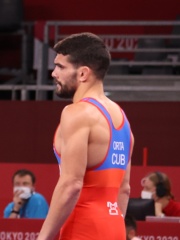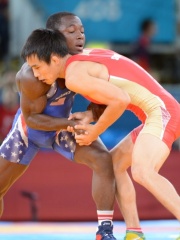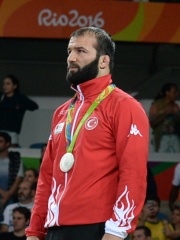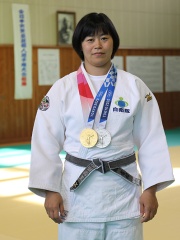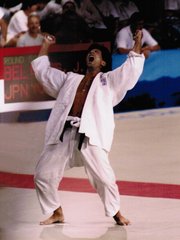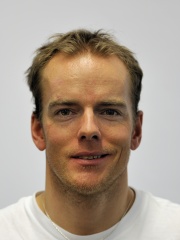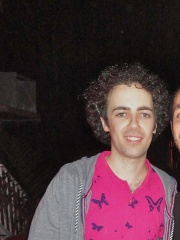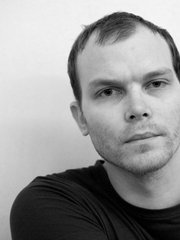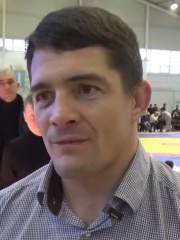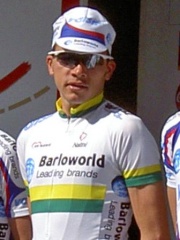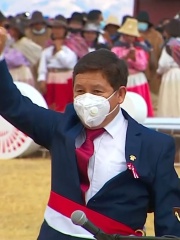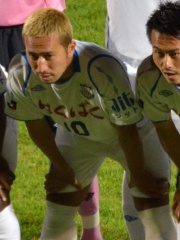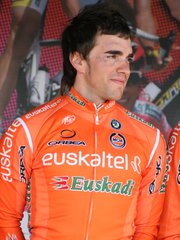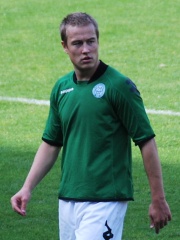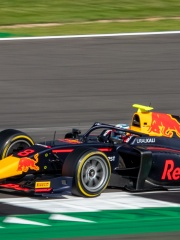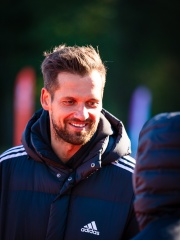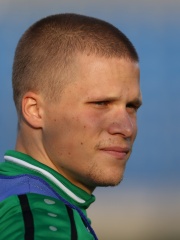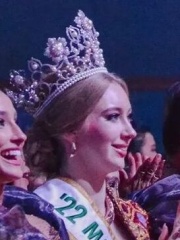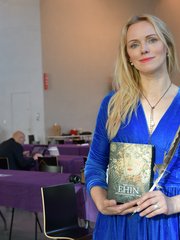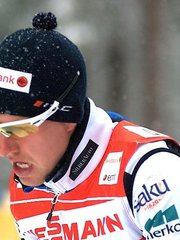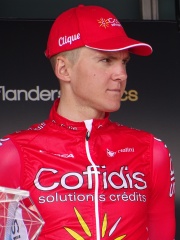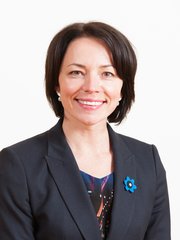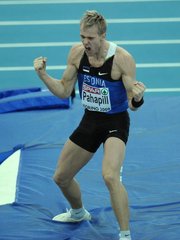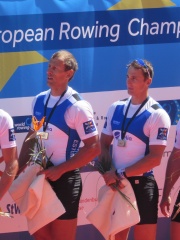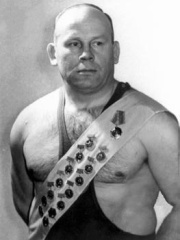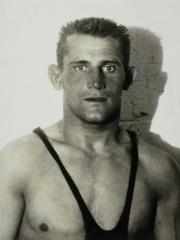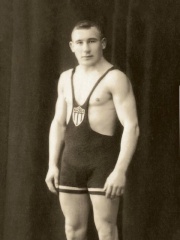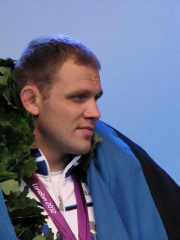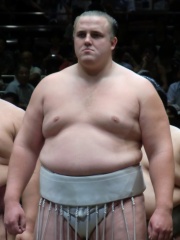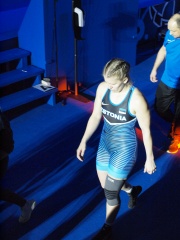Wrestler
Martin Padar
1979 - today
EN.WIKIPEDIA PAGE VIEWS (PV)

 Martin Padar
Martin Padar
Martin Padar (born 11 April 1979 in Tallinn, Estonia) is an Estonian judoka, who has competed in the men's half heavyweight (–100 kg) and later in the heavyweight (+100 kg) category. A 2009 European champion, he has also competed at two Olympics, the 2008 Beijing Olympics and the 2012 London Olympics. Read more on Wikipedia
His biography is available in 16 different languages on Wikipedia (up from 15 in 2024). Martin Padar is the 1,051st most popular wrestler (down from 920th in 2024), the 353rd most popular biography from Estonia (down from 337th in 2019) and the 11th most popular Estonian Wrestler.
Memorability Metrics
Page views of Martin Padar by language
Among Wrestlers
Among wrestlers, Martin Padar ranks 1,051 out of 1,027. Before him are Jackeline Rentería, Marianna Sastin, Luis Orta, Catherine Beauchemin-Pinard, Mingiyan Semenov, and Selim Yaşar. After him are Adam Okruashvili, Javid Hamzatau, Shori Hamada, Kim Min-jong, Jade Cargill, and Jason Morris.
Most Popular Wrestlers in Wikipedia
Go to all RankingsJackeline Rentería
1986 - Present
HPI: 37.71
Rank: 1,045
Marianna Sastin
1983 - Present
HPI: 37.67
Rank: 1,046
Luis Orta
1994 - Present
HPI: 37.66
Rank: 1,047
Catherine Beauchemin-Pinard
1994 - Present
HPI: 37.59
Rank: 1,048
Mingiyan Semenov
1990 - Present
HPI: 37.58
Rank: 1,049
Selim Yaşar
1990 - Present
HPI: 37.57
Rank: 1,050
Martin Padar
1979 - Present
HPI: 37.55
Rank: 1,051
Adam Okruashvili
1989 - Present
HPI: 37.55
Rank: 1,052
Javid Hamzatau
1989 - Present
HPI: 37.51
Rank: 1,053
Shori Hamada
1990 - Present
HPI: 37.51
Rank: 1,054
Kim Min-jong
2000 - Present
HPI: 37.50
Rank: 1,055
Jade Cargill
1992 - Present
HPI: 37.50
Rank: 1,056
Jason Morris
1967 - Present
HPI: 37.48
Rank: 1,057
Contemporaries
Among people born in 1979, Martin Padar ranks 1,366. Before him are Jens Filbrich, Tate Ellington, High Contrast, Gabriel Mercedes, Johan Harstad, and Aleksey Mishin. After him are Ryan Cox, Guido Bellido, Ken Fujita, Aitor Galdós, Kelly Santos, and Satoshi Horinouchi.
Others Born in 1979
Go to all RankingsJens Filbrich
SKIER
1979 - Present
HPI: 37.64
Rank: 1,360
Tate Ellington
ACTOR
1979 - Present
HPI: 37.63
Rank: 1,361
High Contrast
MUSICIAN
1979 - Present
HPI: 37.62
Rank: 1,362
Gabriel Mercedes
ATHLETE
1979 - Present
HPI: 37.60
Rank: 1,363
Johan Harstad
WRITER
1979 - Present
HPI: 37.60
Rank: 1,364
Aleksey Mishin
ATHLETE
1979 - Present
HPI: 37.58
Rank: 1,365
Martin Padar
WRESTLER
1979 - Present
HPI: 37.55
Rank: 1,366
Ryan Cox
CYCLIST
1979 - 2007
HPI: 37.54
Rank: 1,367
Guido Bellido
POLITICIAN
1979 - Present
HPI: 37.52
Rank: 1,368
Ken Fujita
SOCCER PLAYER
1979 - Present
HPI: 37.51
Rank: 1,369
Aitor Galdós
CYCLIST
1979 - Present
HPI: 37.50
Rank: 1,370
Kelly Santos
BASKETBALL PLAYER
1979 - Present
HPI: 37.49
Rank: 1,371
Satoshi Horinouchi
SOCCER PLAYER
1979 - Present
HPI: 37.48
Rank: 1,372
In Estonia
Among people born in Estonia, Martin Padar ranks 353 out of NaN. Before him are Andrei Sidorenkov (1984), Jüri Vips (2000), Magnus Kirt (1990), Henrik Ojamaa (1991), Jasmin Selberg (1999), and Kristiina Ehin (1977). After him are Aivar Rehemaa (1982), Gert Jõeäär (1987), Liina Kersna (1980), Mikk Pahapill (1983), Kaspar Taimsoo (1987), and Henri Anier (1990).
Others born in Estonia
Go to all RankingsAndrei Sidorenkov
SOCCER PLAYER
1984 - Present
HPI: 38.07
Rank: 347
Jüri Vips
RACING DRIVER
2000 - Present
HPI: 37.94
Rank: 348
Magnus Kirt
ATHLETE
1990 - Present
HPI: 37.94
Rank: 349
Henrik Ojamaa
SOCCER PLAYER
1991 - Present
HPI: 37.86
Rank: 350
Jasmin Selberg
CELEBRITY
1999 - Present
HPI: 37.85
Rank: 351
Kristiina Ehin
PHILOSOPHER
1977 - Present
HPI: 37.68
Rank: 352
Martin Padar
WRESTLER
1979 - Present
HPI: 37.55
Rank: 353
Aivar Rehemaa
SOCCER PLAYER
1982 - Present
HPI: 37.41
Rank: 354
Gert Jõeäär
CYCLIST
1987 - Present
HPI: 37.33
Rank: 355
Liina Kersna
POLITICIAN
1980 - Present
HPI: 37.12
Rank: 356
Mikk Pahapill
ATHLETE
1983 - Present
HPI: 37.02
Rank: 357
Kaspar Taimsoo
ATHLETE
1987 - Present
HPI: 36.93
Rank: 358
Henri Anier
SOCCER PLAYER
1990 - Present
HPI: 36.73
Rank: 359
Among Wrestlers In Estonia
Among wrestlers born in Estonia, Martin Padar ranks 11. Before him are Johannes Kotkas (1915), Voldemar Väli (1903), Osvald Käpp (1905), Heiki Nabi (1985), Indrek Pertelson (1971), and Baruto Kaito (1984). After him are Epp Mäe (1992).
Johannes Kotkas
1915 - 1998
HPI: 57.24
Rank: 5
Voldemar Väli
1903 - 1997
HPI: 56.60
Rank: 6
Osvald Käpp
1905 - 1995
HPI: 55.37
Rank: 7
Heiki Nabi
1985 - Present
HPI: 45.14
Rank: 8
Indrek Pertelson
1971 - Present
HPI: 45.09
Rank: 9
Baruto Kaito
1984 - Present
HPI: 43.70
Rank: 10
Martin Padar
1979 - Present
HPI: 37.55
Rank: 11
Epp Mäe
1992 - Present
HPI: 34.71
Rank: 12
